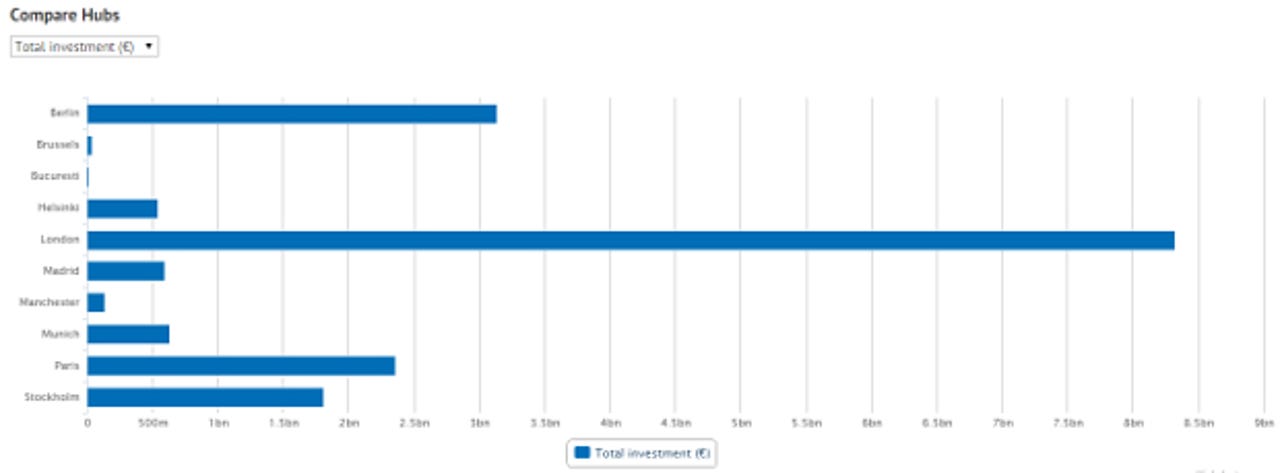So how do Europe's tech startups rate? This tool aims to show you


The new initiative is designed to gather data such as revenue growth and employee numbers and provide information about the founders and funders of startups across major European communities.
Initially, the mapping platform is covering activity in Bucharest, Brussels, Helsinki, London, Madrid, Manchester, Munich, Paris, and Stockholm, as research showed that investment in those cities' startups increased by 174 percent in 2013 to 2014, with funding rocketing from €2.4bn to €6.6bn ($2.73bn to $7.5bn).
The European Commission is working with partners in each city, such as Trampoline Systems in London - a business data specialist which is coordinating the programme along with financial adviser Grant Thornton UK - and NUMA, a tech and innovation hub in central Paris.
A further 10 cities will be part of the next phase of the project by the end of 2015, with additional cities added in 2016.
"Dynamic mapping will give a unique insight into emerging startup ecosystems, providing detailed information and regular updates of their basic characteristics," European Commission digital single market VP Andrus Ansip said.
"The new mapping tool will show the geographic distribution of startups together with their financial data, for example. Perhaps more importantly, it will provide service and customer-related data, along with the factors which led to the venture's setup and success - or failure."
At the mapping tool's recent launch in Brussels, Ansip stressed how important he feels new businesses are to Europe, explaining that they are "vital to Europe's economy and job market".
See also
"Nobody creates more jobs than startups and other young companies. They provide around 50 percent of all jobs created," he said, adding that the mapping system will also help policymakers and regulators know exactly how to provide the help - in the best and most appropriate ways - that startups really need.
The question of how useful and valuable the new system will be and how best it can be used to boost startup activity in Europe has been a major issue for NUMA in Paris, which has been presenting the mapping programme and holding debates to feed back to the EU how it can be best utilised and improved.
"The EU must clearly set the goals for such a mapping system and build it around those goals. At the moment it's still unclear how it can be used," NUMA's Tanguy Joannot said.
NUMA created the first co-working space back in 2008, of which there are now more than 300 in the country, and set up France's first accelerator in 2011.
Now with more than 200 incubators and accelerators, startup activity in France is booming as never before, with Paris even ranking 11th in Compass's global Startup Ecosystem Ranking, behind: Silicon Valley, New York City, Los Angeles, Boston, Tel Aviv, London, Chicago, Seattle, Berlin, and Singapore.
While in the past, the EU has worked to open up the startup sector, some would say it has made little progress. However, Joannot believes that now the EU is working with private structures - such as NUMA, which is dedicated to building and structuring the community - it is improving, and more likely to be successful.
"For example, after the EU launched the Atalanta project, which aims at promoting entrepreneurship and innovation at a European transnational level, we created the Atalanta network," he said.
"This is made up of a network of European accelerators including NUMA in France, Beta-i in Portugal, Tetuan Valley in Spain, and H-Farm in Italy. As a result, last year NUMA organised the European Accelerator Summit. This event increases opportunities for startups and this year's will be run by Beta-i next month."
So how does Joannot believe the new mapping platform can help to boost Europe's thriving startup scene?
"Actually, this map would be useful for venture capitalists, and thus for startups," he said. "Let's imagine an American VC who wants to invest in Europe. Well, this map provides him with an overview of the European startup ecosystem and an index of the startups."
The online mapping system is part of the Startup Europe programme, which provides advice, networking and legal assistance to European startups through its Startup Europe Club website.
More on startups
- From robotics to analytics, why NASA is offering startups over 1,000 patents for 'free'
- The health of IBM's Watson: Its future lies in startups
- Airbnb quietly acquires connected sensor startup Lapka
- Autodesk acquires software startup netfabb to bolster prototyping design
- Oh no, startups are now Australia's political battleground
- Apple acquires mapping visualisation startup Mapsense